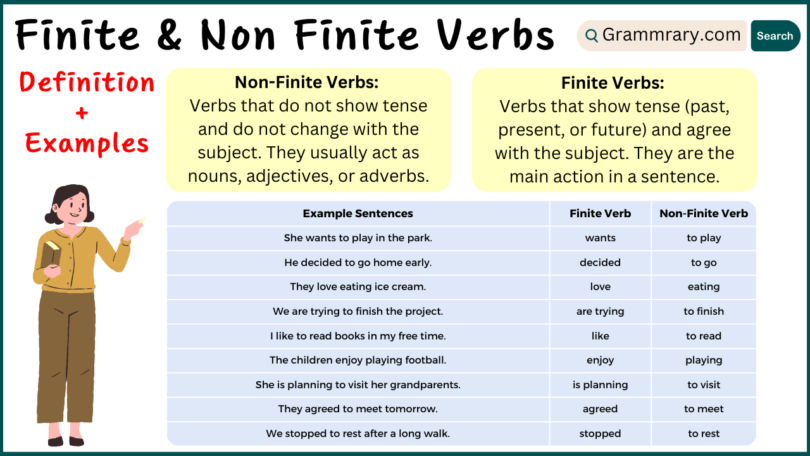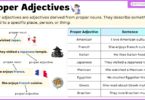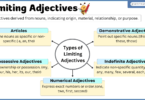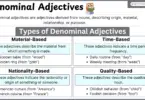What Are Finite Verbs?
Finite verbs are verbs that are connected to the subject of a sentence and show tense (past, present, or future). They carry information about the subject’s number (singular or plural) and person (first, second, or third person).
Finite verbs are essential to forming complete sentences because they work as the main verbs that express actions or states in a specific time.
Key Characteristics of Finite Verbs:
- They change according to tense (past, present, future).
- They match the subject in number and person.
- They can be used alone as the main verb in a sentence.
Example Sentences of Finite Verbs:
| Sentence | Finite Verb | Tense |
|---|---|---|
| She eats an apple every day. | eats | Present |
| We went to the park yesterday. | went | Past |
| They will study for the exam. | will study | Future |
What Are Non-Finite Verbs?
Non-finite verbs do not show tense and are not affected by the subject’s number or person. They cannot be the main verb of a sentence by themselves. Instead, they are often used in combination with finite verbs or serve other grammatical functions.
Types of Non-Finite Verbs:
- Infinitives (e.g., “to eat,” “to run”)
- Gerunds (e.g., “eating,” “running”)
- Participles (e.g., “eaten,” “running”)
Example Sentences of Non-Finite Verbs:
| Sentence | Non-Finite Verb | Type |
|---|---|---|
| She wants to travel the world. | to travel | Infinitive |
| Running every morning is a good habit. | Running | Gerund |
| The broken vase was on the table. | broken | Participle |
Differences Between Finite and Non-Finite Verbs
| Finite Verbs | Non-Finite Verbs |
|---|---|
| Show tense (past, present, future) | Do not show tense |
| Agree with the subject in number and person | Do not change based on subject |
| Can be the main verb of a sentence | Cannot be the main verb alone |
| Example: She runs fast. | Example: Running fast is fun. |
Types of Non-Finite Verbs in Detail
1. Infinitives
Infinitives are the base form of a verb, usually preceded by “to.” They can act as nouns, adjectives, or adverbs.
Examples of Infinitives:
- I love to dance. (to dance acts as a noun)
- She has a lot of energy to give. (to give acts as an adjective)
2. Gerunds
A gerund is the -ing form of a verb that functions as a noun.
Examples of Gerunds:
- Swimming is my favorite activity. (swimming acts as a subject)
- He enjoys reading books. (reading acts as an object)
3. Participles
Participles function as adjectives and describe nouns. There are two types:
- Present Participles (e.g., running, dancing)
- Past Participles (e.g., broken, eaten)
Examples of Participles:
- The running water was cold. (running describes the water)
- The cooked meal smells delicious. (cooked describes the meal)
Practical Examples: Finite vs. Non-Finite Verbs in Sentences
To further clarify the concept, let’s look at some side-by-side examples of how finite and non-finite verbs are used in the same sentence.
| Sentence | Finite Verb | Non-Finite Verb |
|---|---|---|
| She is going to study tonight. | is going | to study |
| They have finished eating dinner. | have finished | eating |
| We are trying to learn English. | are trying | to learn |
How to Identify Finite and Non-Finite Verbs
Here are some easy tips to help you quickly identify whether a verb is finite or non-finite:
- Finite Verbs: Look for the verb that agrees with the subject and shows tense.
- Example: He runs. (“runs” shows present tense and agrees with the subject “He”)
- Non-Finite Verbs: Look for the verb that doesn’t change with the subject or time.
- Example: Running is fun. (“running” does not show tense or agreement with the subject)
Common Mistakes to Avoid
- Confusing Gerunds with Present Participles: Remember that gerunds function as nouns, while present participles act as adjectives or help form continuous tenses.
- Correct: Swimming is fun. (Gerund)
- Incorrect: Swimming the water is fun. (Wrong use of participle)
- Using Non-Finite Verbs as Main Verbs: Non-finite verbs cannot stand alone as the main verb.
- Correct: He is planning to go.
- Incorrect: He to go.
Example Sentences of finite vs Non Finite Verbs
| Example Sentences | Finite Verb | Non-Finite Verb |
|---|---|---|
| She wants to play in the park. | wants | to play |
| He decided to go home early. | decided | to go |
| They love eating ice cream. | love | eating |
| We are trying to finish the project. | are trying | to finish |
| I like to read books in my free time. | like | to read |
| The children enjoy playing football. | enjoy | playing |
| She is planning to visit her grandparents. | is planning | to visit |
| They agreed to meet tomorrow. | agreed | to meet |
| He kept talking during the meeting. | kept | talking |
| We stopped to rest after a long walk. | stopped | to rest |
| He started running early in the morning. | started | running |
| I am learning to speak Spanish. | am learning | to speak |
| They forgot to lock the door. | forgot | to lock |
| She began writing her essay. | began | writing |
| We hope to see you soon. | hope | to see |
| He promised to call me later. | promised | to call |
| She continued reading the book quietly. | continued | reading |
| They need to study for the exam. | need | to study |
| He tried to fix the car himself. | tried | to fix |
| We started working on the project early. | started | working |
Learn more English Grammar








